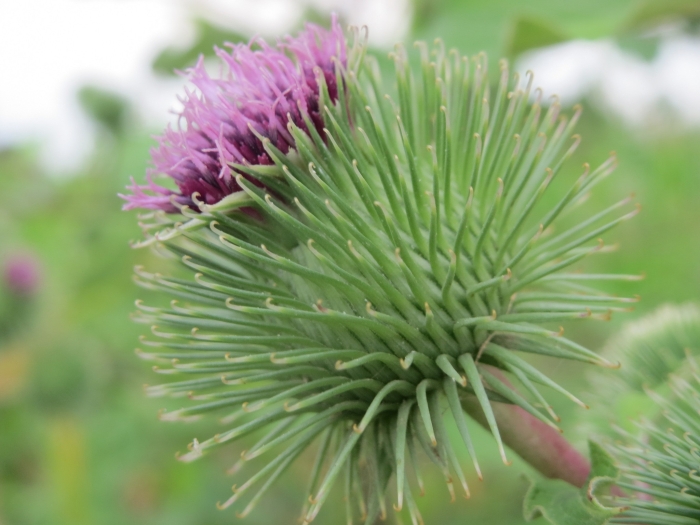Greater Burdock
(Arctium lappa)
Greater Burdock (Arctium lappa)
/
/

Andreas Rockstein
CC BY-SA 4.0
Image By:
Andreas Rockstein
Recorded By:
Copyright:
CC BY-SA 4.0
Copyright Notice:
Photo by: Andreas Rockstein | License Type: CC BY-SA 4.0 | License URL: http://creativecommons.org/licenses/by-sa/4.0/ | Rights Holder: Andreas Rockstein | Publisher: iNaturalist | Date Created: 2016-07-22T18:40:49-07:00 |
























Estimated Native Range
Summary
Arctium lappa, commonly known as Greater Burdock or Edible Burdock, is a biennial herb native to temperate regions of Eurasia. It thrives in a variety of habitats including disturbed areas, edges of forests, roadsides, and grasslands, often where the soil is rich in nitrogen. This plant can reach up to 10 feet in height and is characterized by its large, heart-shaped leaves and stout, grooved stems. From July to September, it produces globular clusters of purple flowers, which are quite showy and are followed by burrs with hooked bracts that facilitate seed dispersal by clinging to animals and clothing.
Greater Burdock is valued for its deep taproot which is harvested for use in traditional medicine and as a vegetable, particularly in Asian cuisine. The root is crisp and has a sweet, mild, and pungent flavor, making it a popular ingredient in dishes such as kinpira gobo and burdock makizushi. In cultivation, it requires full sun to part shade, and well-drained soil with high organic content. While it is a useful plant, it is also known to be potentially invasive outside its native range, and gardeners should be cautious about its aggressive seed dispersal. It is not typically grown ornamentally but may be found in herb gardens or grown for its edible root.CC BY-SA 4.0
Greater Burdock is valued for its deep taproot which is harvested for use in traditional medicine and as a vegetable, particularly in Asian cuisine. The root is crisp and has a sweet, mild, and pungent flavor, making it a popular ingredient in dishes such as kinpira gobo and burdock makizushi. In cultivation, it requires full sun to part shade, and well-drained soil with high organic content. While it is a useful plant, it is also known to be potentially invasive outside its native range, and gardeners should be cautious about its aggressive seed dispersal. It is not typically grown ornamentally but may be found in herb gardens or grown for its edible root.CC BY-SA 4.0
Plant Description
- Plant Type: Herb
- Height: 2-10 feet
- Width: 2-4 feet
- Growth Rate: Rapid
- Flower Color: Purple
- Flowering Season: Fall
- Leaf Retention: Deciduous
Growth Requirements
- Sun: Full Sun, Part Shade
- Water: Medium
- Drainage: Medium
Common Uses
Bee Garden, Edible*Disclaimer: Easyscape's listed plant edibility is for informational use. Always verify the safety and proper identification of any plant before consumption., Low Maintenance
Natural Habitat
Temperate regions of Eurasia, including disturbed areas, edges of forests, roadsides, and grasslands
Other Names
Common Names: Greater Burdock, Burdock, Edible Burdock, Gobo, Great Burdock, Thorny Burr, Greater Burrdock
Scientific Names: , Arctium lappa, Arctium edule, Arctium lappa, Arctium lappa var. lappa, Lappa bardana var. major ?elak., Lappa vulgare, Lappa vulgaris subsp. vulgaris, Lappa vulgaris var. vulgaris,
GBIF Accepted Name: